the history of yeovil's pubs
PUBS HOME PAGE |
PUBS INTRODUCTION |
PUBS BY NAME |
BEERHOUSES |
pen mill hotel
Pen Mill
 The
area known as
Pen Mill is
named for the
water mill close
by. Pen Mill may
have existed
before Domesday
as the manor
mill for
Kingston, there
are ample
remains of the
substantial
post-medieval
mill but little
above ground
sign of any
earlier
structure.
The
area known as
Pen Mill is
named for the
water mill close
by. Pen Mill may
have existed
before Domesday
as the manor
mill for
Kingston, there
are ample
remains of the
substantial
post-medieval
mill but little
above ground
sign of any
earlier
structure.
The Pen Mill Hotel, was built in the late 1850's (it was certainly not built by the time of the 1842 Tithe Map), it was not built as a coaching inn as these were in the town centre (although the hotel did have an ostler and extensive stabling to care for guests' horses) but chiefly to serve travellers using the newly-opened Pen Mill railway station. There had, of course, been a public house (although its reputation was as a cider house) in a converted cottage a hundred yards or so to the southeast, on the left and halfway to the water mill known as the Pen Mill Inn. But this house ceased trading when the bridge over the railway was built and the associated raising of the roadway level effectively cut it off from the main road itself in the 1860's. It reverted to cottages for another hundred years and was demolished around 1961.
In 1859 a lease was signed between Captain William J Prowse of Enham House, Southampton, Lord of the Manor of Kingston and the owner of the Pen Mill Inn, and John Stone, Yeoman, 'of Pen Mill Inn' for a term of seven years and the lease contains interesting references to the inn - "Pen Mill Inn, stables, stalls, yards, barton and gardens are included in Great Meadway (the name of the field). In the bar - 2 beer engines, 6 motions, 11 spirit taps, jars and piping, shelving behind and both sides of the bar, counters and seven drawers. In pantry - shelves, cupboards and drawers, in the tap room - fixed forms, lead pipe and tap in water closet. Stables and yards, gas fittings and bells, door and fixings to the coal house and shoe house, the fowl house, the lamp over the front door and two long signboards fixed to the walls of the house."
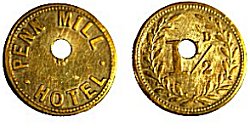 At left is an
undated, but
probably late
Victorian,
public house
'check' or trade
token issued at
the Pen Mill
Hotel. It is
made of tinned
brass, is 23.7mm
in diameter and
has a plain
edge. On the
obverse it says
"PEN MILL -
HOTEL" and on
the reverse,
within a wreath,
is its value -
1½D. At this
time a
penny-halfpenny
could buy you a
pint of ale.
Checks were
frequently used
in games, such
as skittles or
quoits where,
for instance,
players would
'chip in' a
check to the
'kitty' which
would be won by
the winning team
to redeem at the
bar. By issuing
checks a
landlord could
guarantee they
would be spent
in his
establishment
only.
At left is an
undated, but
probably late
Victorian,
public house
'check' or trade
token issued at
the Pen Mill
Hotel. It is
made of tinned
brass, is 23.7mm
in diameter and
has a plain
edge. On the
obverse it says
"PEN MILL -
HOTEL" and on
the reverse,
within a wreath,
is its value -
1½D. At this
time a
penny-halfpenny
could buy you a
pint of ale.
Checks were
frequently used
in games, such
as skittles or
quoits where,
for instance,
players would
'chip in' a
check to the
'kitty' which
would be won by
the winning team
to redeem at the
bar. By issuing
checks a
landlord could
guarantee they
would be spent
in his
establishment
only.
Yeovil Casuals, founded in 1895 and renamed Yeovil Town Football Club in 1907, played at the Pen Mill Athletic Ground with their headquarters in the Pen Mill Hotel. During the Second World War the Pen Mill Hotel was "Civil Defence Rendezvous Point No 24".
In the Yeovil Guide of 1962 the Manor Hotel and the Mermaid Hotel were the most expensive hotels in Yeovil with Bed and Breakfast from 25/- per night (about £48 at today's value). For comparison the Three Choughs Hotel was 22/6 per night, the Pen Mill Hotel was 16/-, the Elephant & Castle Hotel was 15/6 and the Globe & Crown was cheapest at 14/6 (about £13.50 at today's value). By 1970 the prices were still the most expensive at the Manor Hotel with Bed & Breakfast from 45/- to 55/- per night (£50 to £63 at today's value), lunch at 14/6 (about £19) and dinner at 16/6 (about £22). Again for comparison, Bed & Breakfast at the Three Choughs Hotel was 42/- per night with breakfast only at 9/6 and tea from 3/6, the Preston Hotel was from 32/6 per night with lunch at 12/6 and dinner from 14/6, the Butchers Arms was 25/- for a single and 45/- for a double room per night and the Elephant & Castle Hotel was cheapest at 21/6 (about £29) per night.
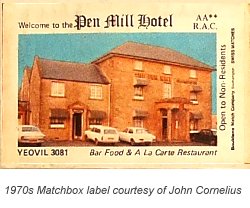 The current Pen
Mill Hotel is a
large double
fronted, three
storey building
with a two
storey side
annex and
extensions to
the rear. It is
built of ashlar
under a Welsh
slate roof. The
main entrance
has a good stone
portico
supported by a
pair of
Corinthian
columns while
the entrance to
the side
extension is
flanked by large
squared
pilasters with a
pediment over.
The current Pen
Mill Hotel is a
large double
fronted, three
storey building
with a two
storey side
annex and
extensions to
the rear. It is
built of ashlar
under a Welsh
slate roof. The
main entrance
has a good stone
portico
supported by a
pair of
Corinthian
columns while
the entrance to
the side
extension is
flanked by large
squared
pilasters with a
pediment over.
Following a fire the hotel has been refurbished in recent years and now has large open bar areas, a separate restaurant and accommodation.
![]()
The first recorded licensee was John Stone born around 1827 at Hillfield, Dorset (ten miles south southwest of Yeovil) but there are simply too many John Stones in the area to be able to discern his early life. He is first listed as the Pen Mill's licensee in Harrison, Harrod & Co's Directory of 1859 and in the 1861 census he is listed as the hotel keeper and farmer of 100 acres employing 3 men and 2 boys. He is listed with his wife, Elizabeth, and five children under 9, the first born at Hillfield, the remainder in Yeovil. John died in December 1864, aged about 37. Elizabeth was listed as licensee in Kelly's Directory of 1866 but by 1871 she and four of the children were living at Leigh, Dorset, to the south of Yeovil, where Elizabeth lived as an annuitant (ie living on an insurance annuity or pension).
John Alfred Stewart was licensee by 1871 and remained as such for the next twenty years or so. He was born in Taunton, Somerset, about 1835 the son of innkeeper John Stewart and his wife, Hannah and the 1841 census lists the family of six in Silver Street, Taunton. By 1851 John's father had died and he was living with his mother and sister in Taunton. At this time he was aged 17 and was an attorney's clerk. In 1858 he married Sarah Phelps in Axminster, Devon and they lived for a time in South Wales where one of their daughters was born. By 1871 John, Sarah and their two daughters were living at the Pen Mill Hotel where the census listed John's occupation as hotel keeper and coal and salt merchant. Living with them were two of Sarah's sisters. Also living-in were a cook, chambermaid, barmaid, ostler and a boots. In the 1881 census John was listed as a licensed victualler and was living at the Pen Mill with Sarah and daughter Elizabeth. The number of live-in staff had dropped to a barmaid, general servant and an ostler. There was one guest staying in the hotel. In 1891 John was listed as the hotel proprietor and was living with Elizabeth and five staff - two barmaids, waitress, housemaid/cook and a boots but there were no guests. John and Sarah had left the Pen Mill by 1896 and in the 1901 census John and daughter Elizabeth were living in Exeter, Devon, with 66-year old John's occupation given as coal merchant and Elizabeth listed as a laundress. John died around 1914 in Newton Abbot, Devon.
Henry Strangways
Bennett was
listed as the
licensee of the
Pen Mill Hotel
in the 1896
edition of
Whitby's Yeovil
Almanack
Advertiser. He
was born in
Rawmarsh,
Yorkshire around
1862, the son of
George Bennett
and his wife,
Harriett, née
Strangways. In
1871 the family
were living in
the Eastwood Inn
in Rotherham,
Yorkshire and
ten years later
both Henry and
his sister,
Beatrice,
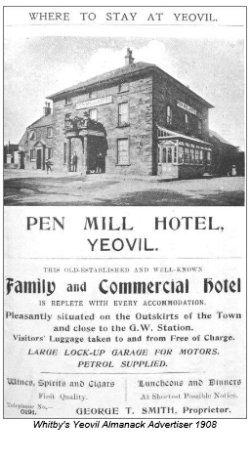 were
assisting their
publican father.
By 1896 Henry
had married
Elizabeth Anna
Stewart and he
was listed as
the licensee of
the Pen Mill
Hotel, as noted
above, in
Whitby's. In the
1901 census Henry and
Elizabeth are
listed with four
live-in staff
and one guest.
Henry was last
listed as
licensee in
Whitby's 1903
edition and in
June 1904
Elizabeth died.
Henry married
his new wife,
Emma, in 1906
and in the 1911
census they are
listed living in
Melbury Osmond,
Dorset, (where
Emma was born),
with 3-year old
and 9-month old
daughters and a
young house
servant. Henry,
at the age of
49, was now
described as
living on
'private means'.
Henry died in
Bridport,
Dorset, in 1940
aged about 78.
were
assisting their
publican father.
By 1896 Henry
had married
Elizabeth Anna
Stewart and he
was listed as
the licensee of
the Pen Mill
Hotel, as noted
above, in
Whitby's. In the
1901 census Henry and
Elizabeth are
listed with four
live-in staff
and one guest.
Henry was last
listed as
licensee in
Whitby's 1903
edition and in
June 1904
Elizabeth died.
Henry married
his new wife,
Emma, in 1906
and in the 1911
census they are
listed living in
Melbury Osmond,
Dorset, (where
Emma was born),
with 3-year old
and 9-month old
daughters and a
young house
servant. Henry,
at the age of
49, was now
described as
living on
'private means'.
Henry died in
Bridport,
Dorset, in 1940
aged about 78.
After Henry left the Pen Mill, George Smith ran it for a couple of years, followed by Jesse Paul from around 1909 until at least 1914. Then came Urbane Lot followed by PE and Ernest Lewis and, finally, JG Patrick from at least 1947 until the 1960's.
Sketch Plans of the Pen Mill Hotel
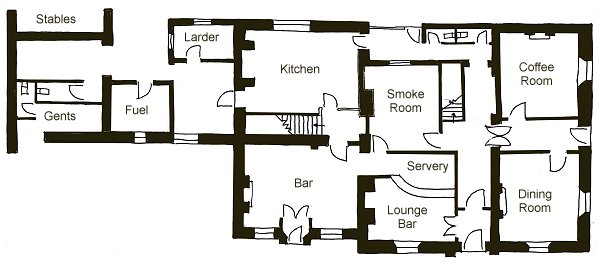
This is a sketch based on plans held at the Heritage Centre, Taunton. The original plans are dated 1934 when J Brutton & Sons were the owners.
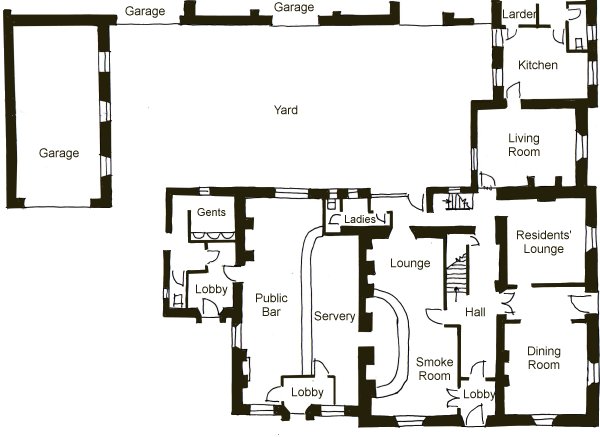
This is a sketch based on further plans held at the Heritage Centre, Taunton. The original plans are dated 1966 when the hotel was owned by Charrington & Co (SW) Ltd. By building a new kitchen the public bar doubled in size. The three garages shown were originally stables - the skittle alley ran along the top two at first floor level.
gallery
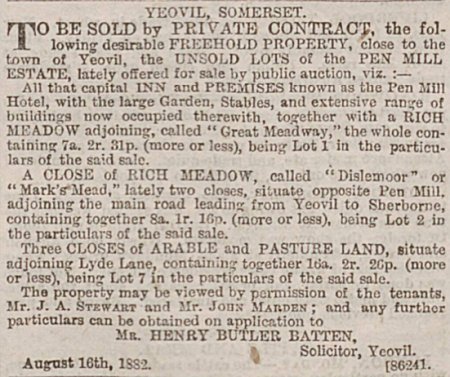
This notice in the Western Gazette's edition of 18 August 1882 was for the sale of "Unsold Lots of the Pen Mill Estate" including the Pen Mill Hotel.
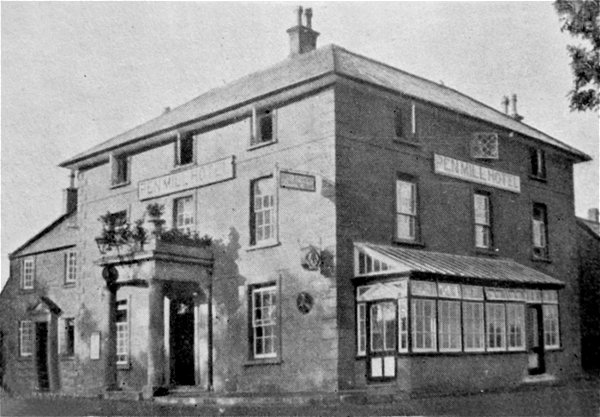
From my
collection
The Pen Mill Hotel, photographed around 1908.
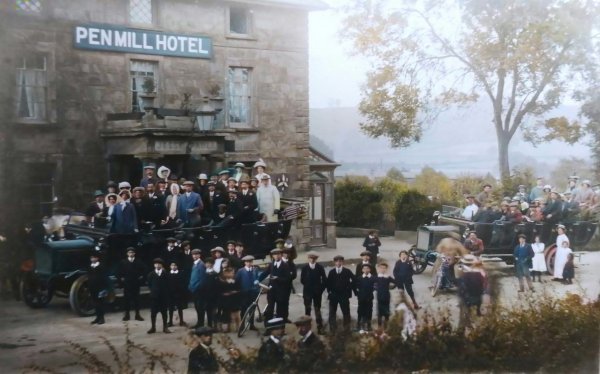
From my
collection
The Pen Mill Hotel's regulars and their families pose for a (colourised) photograph as they prepare for a day's outing in two charabancs. The photograph dates to between 1908 and 1914, when Jesse Paul was the owner.
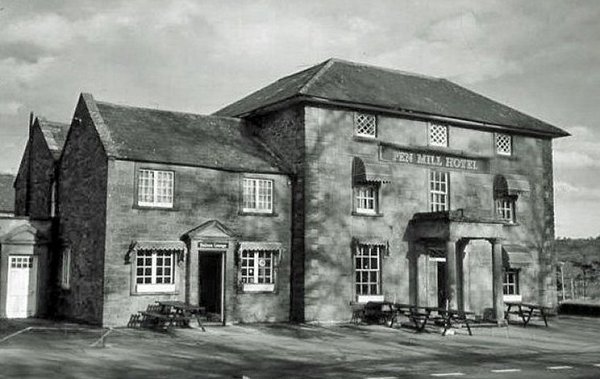
The Pen Mill Hotel photographed in the late 1950s.
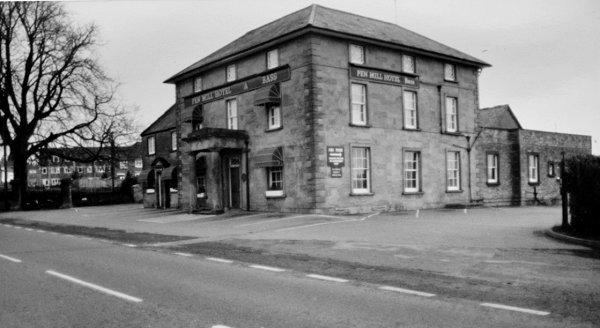
Courtesy of
Chris
Rendell
The Pen Mill Hotel photographed in 1985.

The Pen Mill Hotel, photographed in 2012.
licensees
1859 – John
Stone (Harrison,
Harrod & Co 1859
Directory)
listed as Pen
Mill, Pen Mill
Station
1861 – John
Stone – Hotel
Keeper (1861
census) listed
as Pen Mill
Hotel
1866 – Mrs
Elizabeth Stone
(Kelly's 1866
Directory)
1868 – Charles
Andrews took the
lease of Pen
Mill Hotel and
farm for 7 years
at £260
1871 – John
Stewart – Hotel
Keeper and Coal
& Salt Merchant
(1871 census) as
Pen Mill Hotel
1875 – John
Alfred Stewart –
Coal Merchant
(Kelly's 1875
Directory)
1881 – John
Stewart –
Licensed
Victualler (1881
census) listed
as Pen Mill
Hotel
1891 – John
Stewart – Hotel
Proprietor (1891
census) listed
as Pen Mill
Hotel
1896 – HS
Bennett –
Proprietor
(Whitby's Yeovil
Almanack
Advertiser 1896)
1897 – Henry
Bennett (Kelly’s
1897 Directory)
listed as Pen
Mill Hotel
1898 – Henry
Strangways
Bennett
(Whitby's 1898
Yeovil Almanack
Advertiser)
1901 – Henry
Bennett – Hotel
Keeper (1901
census) listed
as Penn Mill
Hotel
1903 – HS
Bennett –
Proprietor
(Whitby's Yeovil
Almanack
Advertiser 1903)
1905 – GT Smith
– Proprietor
(1905 Western
Gazette Almanac)
1908 – George Thomas
Smith - License
transfer
(Borough Petty
Sessions,
February)
1908 – Jesse
Paull - License
transferred
(Borough Petty
Sessions,
February)
1909 – J Paull –
Proprietor (1909
Western Gazette
Almanac)
1911 – Mr Paull
(1911 census
Summary) listed
as Pen Mill
Hotel
1911 – Jesse
Paull (Whitby's
Yeovil Almanack
Advertiser 1911)
1914 – Jesse
Paull (Kelly’s
1914 Directory)
listed as Pen
Mill Hotel
1923 – Urbane
Lot Shepherd
(Kelly’s 1923
Directory)
listed as Pen
Mill Hotel
1936 – PE Lewis
(1936 Yeovil
Directory)
listed as Pen
Mill Hotel
1938 – PE Lewis
(1938 Yeovil
Directory)
listed as Pen
Mill Hotel
1939 – Ernest
Lewis (Kelly’s
1939 Directory)
listed as Pen
Mill Hotel
1947 – JG
Patrick (1947
Yeovil
Directory)
listed as Pen
Mill Hotel
1949 – JG
Patrick (Kelly’s
1949 Directory)
listed as Pen
Mill Hotel
1951 – JG
Patrick (1951
Yeovil
Directory)
listed as Pen
Mill Hotel
1954 – JG
Patrick (1954
Yeovil
Directory)
listed as Pen
Mill Hotel
1957 – JG
Patrick (1957
Yeovil
Directory)
listed as Pen
Mill Hotel
1960 – JG
Patrick (1960
Yeovil
Directory)
listed as Pen
Mill Hotel
1965 – Licensee
not named (1965
Yeovil
Directory)
listed as Pen
Mill Hotel
1968 – Licensee
not named
(Kelly’s 1968
Directory)
listed as Pen
Mill
1969 – Licensee
not named
(Kelly’s 1969
Directory)
listed as Pen
Mill
1970 – Licensee
not named
(Kelly’s 1970
Directory)
listed as Pen
Mill
1971 – Licensee
not named
(Kelly’s 1971
Directory)
listed as Pen
Mill
1972 – Licensee
not named
(Kelly’s 1972
Directory)
listed as Pen
Mill
1973 – Licensee
not named
(Kelly’s 1973
Directory)
listed as Pen
Mill
1974 – Licensee
not named (1974
Yeovil
Directory)
listed as Pen
Mill
1987 – Licensee
not named
(Denton’s 1987
Directory)
listed as
Penmill Hotel